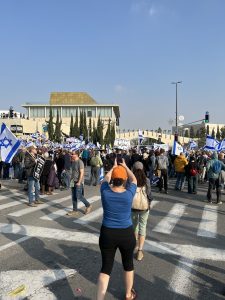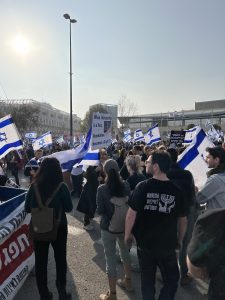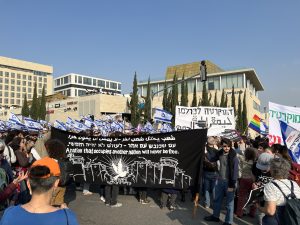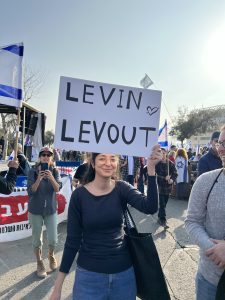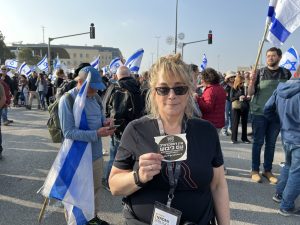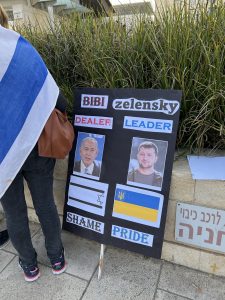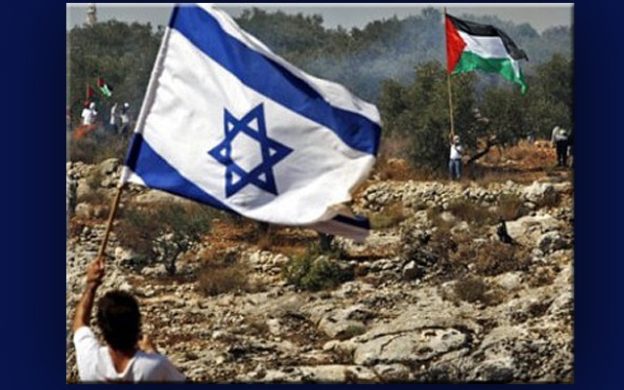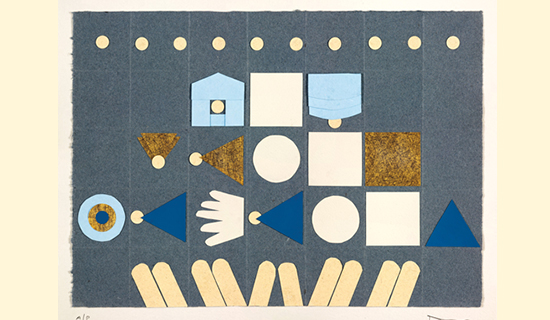At the demonstration before the first reading …
Category: Israel
In the streets of Jerusalem
Off to Israel
Shabbat Shalom
Shabbat Shalom
The prayer, performed by Andrea Bocelli and Ilaria Della Bidia, is a wonderful way to bring in this Shabbat. With all of the turmoil and challenges to peace here, Israel, and around the world, the Prayer is our hope for this Shabbat.
I pray you’ll be our eyes
And watch us where we go
And help us to be wise
In times when we don’t know
Let this be our prayer
When we lose our way
Lead us to a place
Guide us with your grace
To a place where we’ll be safe.
I pray we’ll find your light
I pray we’ll find your light
And hold it in our hearts
And hold it in our hearts
When stars go out each night
When the stars go out each night
Remind us where you are.
Let this be our prayer
Let this be our prayer
When shadows fill our day
When shadows fill our day
Lead us to a place
Guide us with your grace
To a place where we’ll be safe.
A world where pain and
sorrow will be ended
And every heart that’s
broken will be mended
And we’ll remember we
are all God’s children
Reaching out to touch you
Reaching to the sky.
We ask that life be kind
We ask that life be kind
And watch us from above
And watch us from above
We hope each soul will find
We hope each soul will find
Another soul to love
Another soul to love.
Let this be our prayer
Let this be our prayer
Just like every child.
Just like every child.
Needs to find a place
Guide us with your grace.
With your grace
Give us faith so we’ll be safe
Needs to find a place
Guide us with your grace.
Give us faith so we’ll be safe
Shabbat Shalom
As the tragic violence continues in Israel, Cantor Azi Schwartz offers the Hashkiveinu prayer, a prayer for peace- May it come quickly.
Shabbat Shalom
Shabbat Shalom
As part of our recent CCAR* cultural trip to Israel, we visited Polyphony, an organization dedicated to teaching music to young people, Arab and Jew, together. One of the great gifts of humankind is Western Classical Music. The message of this school is that this music belongs to all of us; We all have access to this beauty, regardless of our backgrounds, and through music, we can come together sharing this exquisite high art form.
The following is a clip produced by Polyphony promoting their important work. It is a message of hope and building bridges through the common language of music. Watching the young students perform works of the Masters was inspirational and a wonderful way to welcome Shabbat.
Shabbat Shalom
*CCAR- Central Conference of American Rabbis
Stand and See

I am excited to share that I am co-leading a group of emerging Christian leaders on a trip to Israel as part of the Stand and See Fellowship. This unique initiative sponsored by CLAL brings seminarians to the Holy Land with a rabbi, a Christian scholar, and a local guide. Although our threesome might sound like the beginning of an amusing joke, this is a serious enterprise designed to connect these future faith leaders emotionally, spiritually and intellectually to Israel and promote a nuanced understanding of contemporary Palestinian life.
Learn more
Here is the press release from CLAL:
CLAL is excited, honored and proud to announce our Stand and See Fellowship trip being conducted with Minneapolis’ Luther Seminary. The trip will be co-lead by our colleague and RWB alum, Rabbi David Levin, and Luther Professor, Rev. Matt Skinner Ph.D. Both bring deep experience and intellectual depth to this work — Matt as a professor of New Testament Studies and David with years of congregational, communal and educational leadership — and each is a genuine thought partner whose contributions to Stand and See will be felt far beyond this particular journey.
Death to Natalie Portman?!?
In reaction to Ms. Portman’s decision to reject the Genesis Prize the Jewish world has been a blaze. She has been vilified and pilloried. It seems just a matter of time before someone calls for her head. Ms. Portman was initially vague in her reasons for her action except to say that she did not want to appear to support Netanyahu or policies with which she has serious objections. As a citizen of Israel, a democratic country, she has the right to express her opinions regardless of who may agree.
Israel is ostensibly a Democracy and Ms. Portman is an Israeli citizen. So she is arguably demonstrating a loyalty to her country by exercising her right to an opinion and speaking out. Whether you agree or disagree with her position, her rights as a citizen should be respected and so should she. Ms. Portman is an accomplished, intelligent person.
As such, her opinions are likely thoughtful and deliberate, all the more so given the ramifications of this public stand.
The personal attacks on her and calls for charges of treason and revocation of her Israeli Citizenship are at best extreme and unwarranted. Whether you agree with her position, one can respectfully and even vehemently disagree without resorting to the calumny bandied about. The fact that she is an Israeli citizen and an active supporter of her homeland gives her voice a particular gravitas, something she undoubtedly considered in her decision and public statements. It is inappropriate and shameful that so many rush to judgement, seeking her head.
Our community needs to do better. We argue and disagree all the time. That is part of Jewish and Israeli cultural DNA. But if we forget that we are Am Yisrael we do so at our own peril. Anti-Semitism is alive and well. Those seeking a world without Jews or Israel are plentiful. It would be tragic if we did their work for them through the baseless hatred or Sinat Chinam, our tradition warns us against.
Natalie Portman was awarded the Genesis Prize, the highest achievement of her country Israel. She has decided to take a stand and reject this award. To spurn this national recognition is not done cavalierly, but with forethought. This was not some grade-school essay competition. The Prize signals a deep respect for her and her extraordinary achievements. We might do well to remember that before labeling her with disdain and contempt. Perhaps we might learn from the stand that she has taken and learn something about her, our people, and ourselves.
Beyond UN 2334- A Message of Hope and Peace
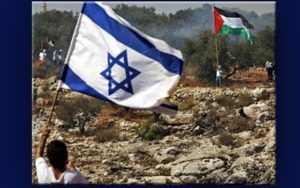 The UN Resolution 2334 has us engaged in a fiery back and forth that is divisive for the world Jewish community, the relationship between the US and Israel, and most importantly deflecting from the important issue at hand; creating a real peace between Israel and the Palestinian people. Let us step back and reflect on the larger issue.
The UN Resolution 2334 has us engaged in a fiery back and forth that is divisive for the world Jewish community, the relationship between the US and Israel, and most importantly deflecting from the important issue at hand; creating a real peace between Israel and the Palestinian people. Let us step back and reflect on the larger issue.
The Israelis and the Palestinians must figure out how to coexist and live side-by-side, respectful and tolerant of the other. Regardless of any UN Resolution, the ultimate responsibility for peace between these two people resides with them. Both sides must want peace enough. This includes each side acting in good faith, building foundations for peace within their respective Peoples and societies and doing things to promote good will instead of things that would be viewed as obstacles to peace. Until and unless both sides can come to the table and have the important and very difficult conversations that conclude in an agreement, peace is not possible.
Those of us on the outside can have our opinions, but only the Israeli and the Palestinian voices truly matter. It is time for those voices to speak out and be heard.
May we hope and pray that in the coming year, 2017, both sides will find a way to reach out to the other, building bridges that ultimately result in both Peoples living peacefully together in the region.
Ken Yehi Ratzon
A Prayer for Israel and a Salute to Independence Day
The phenomenally talented Natanel Hershtik’s beautiful prayer for the State of Israel.

